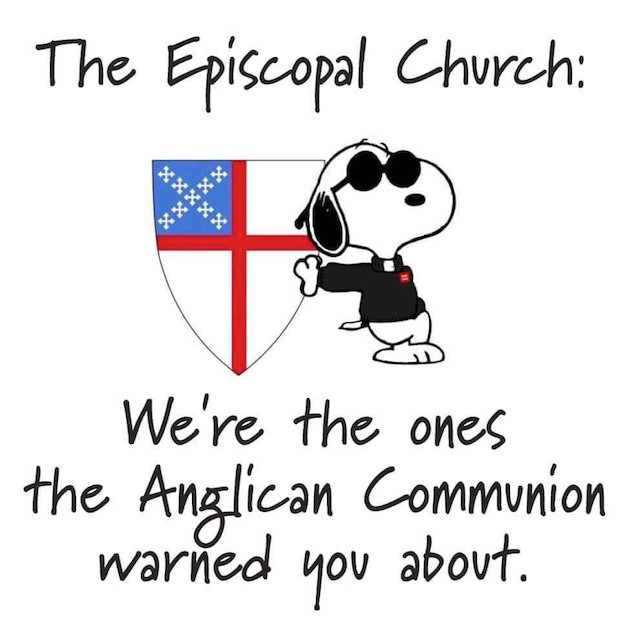
This meme has been going around in my networks since the Anglican Communion put the Episcopal Church on a three-year suspension for its liberal policies on homosexuality.
The punitive measures and conservative statement came after four days of “painful” talks in Canterbury aimed at moving the world’s 85 million-strong Anglican fellowship beyond deep divisions over homosexuality between liberals and conservatives.
An agreement, published on Thursday evening, said the US Episcopal church’s acceptance of same-sex marriage represented “a fundamental departure from the faith and teaching held by the majority of our provinces on the doctrine of marriage”.
In a passage that dismayed liberal Anglicans, the agreement explicitly added: “The traditional doctrine of the church in view of the teaching of scripture, upholds marriage as between a man and a woman in faithful, lifelong union. The majority of those gathered reaffirm this teaching.”
Under the agreement, the US Episcopal church has been banned from representation on key bodies and barred from voting on issues relating to doctrine or strategy for three years. However, it will remain a member of the Anglican communion.
The Presiding Bishop of TEC says that there’s no going back from its pro-gay position. I don’t see how it avoids being thrown out of the Anglican Communion three years from now. But we’ll see.
There’s been a lot of playing the “Martyr For Compassion” among liberal Episcopalians since last week’s act by the Anglican Communion. This is not surprising. Still, it can’t be a good sign that people in a church that has been nearly severed from its historic communion are treating this as a Joe Cool moment. It’s startlingly trite and trivializing. But it may not be entirely unreasonable.
Here’s an interesting report from TEC itself, on where its growth is happening, and why. Overall the church is shrinking, and shrinking dramatically. Only a minority of its parishes are growing at all, and those are primarily in the South and the West, which are more religiously conservative than the Northeast and Midwest, the other two regions surveyed. However, the particular parishes that are growing are, by a large margin, the progressive ones.
This suggests to me that the Episcopal brand has become so identified with liberal Christianity that its only place to grow is among religiously inclined progressives. Most of the conservatives who can’t go along with this have already left. On current trends, TEC is on track to reduce itself to a tiny progressive core. For reasons of theological consistency (with its past actions), and marketing to a shrinking audience, defying the global Anglican Communion and embracing a Joe Cool stance makes some sense. I guess. But contemplate, if you will, an America in which to be a member of The Episcopal Church is to make oneself part of the left-wing vanguard.